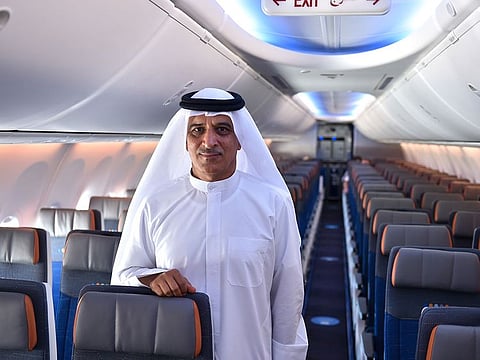Air travel to witness unprecedented demand in 2023-2024: flydubai CEO Ghaith Al Ghaith
flydubai to take 17 737 Max aircraft deliveries and add seven new destinations in 2023

Dubai: After a disastrous two years caused by pandemic-triggered restrictions, the aviation industry is expected to tip into profitability next year, thanks to pent-up travel demand. And Dubai carrier flydubai is most excited for what’s to come in 2023.
After a successful 2021, flydubai’s CEO, Ghaith Al Ghaith, expects the airline to record double-digit operational growth despite rising jet fuel prices and high inflation rates cutting into consumer spending. Al Ghaith said, “I don’t think any of that would hurt demand. My reading is that demand (for air travel) will remain strong until the summer of 2023, and the rest of the year will also be strong. I think 2024 will also continue to be stronger than anybody ever predicted.”
Al Ghaith explained, “For example, China is yet to open its borders fully. We’re also looking at European countries as catchment areas. We are taking 17 new 737 Max aircraft deliveries next year to accommodate the demand.” The carrier was more than 80 per cent bigger than its overall pre-pandemic size in 2019 and is continuously growing in terms of fleet size, destinations, employees, and passenger traffic. In 2023, the airline plans to add seven new routes to its network.
When asked what’s driving the growth, Al Ghaith credited the UAE government’s management of the pandemic and new work visa schemes that have made the country attractive to visitors from all over.
“We are seeing the result of everything the UAE government did over the past few years. The demand is the best I’ve ever seen,” the CEO said. Al Ghaith sat down with media persons for a free-wheeling conversation with the media late last week to discuss flydubai’s success after operating 1,290 flights to the FIFA World Cup in Qatar.
Exited excerpts:
Now that the World Cup is over, what’s next for flydubai?
We’re having a fantastic time. The way our government has managed COVID, and the success of hosting Expo 2020. These two factors have resulted in the demand to travel into the UAE to be out of the world. The trend of pent-up travel demand will continue until 2024. The aftermath of Expo 2020 continues to bring investment and talent into the country. This is the first time we’ve seen such demand. And that is why we’re very optimistic.
Is the demand going to remain sustainable?
Dubai is a standalone destination for tourism, commerce, and business. Moreover, with the residency visa options the UAE government offers, the number of people who want to reside in the country has also risen. More and more people now want to retire in the emirate, bringing a more sustainable business than the events.
How does flydubai plan to tackle rising jet fuel prices?
It is a dynamic situation in the airline business. If the price of fuel is up, then there is a focus on us and others to adjust our prices accordingly. The good news is that our new fleet is 14 per cent more fuel efficient than our older aircraft. We are also looking at using sustainable aviation fuel (SAF). However, that is a task which requires government intervention. Governments and other stakeholders need to increase the supply of SAF for airlines to use. Currently, SAF is very expensive and not readily available.
How did flydubai perform during the World Cup?
We operated 1,290 flights between Dubai World Central (DWC) and Doha International Airport (DIA) to carry 130,000 football fans to the World Cup between November 21 and December 19. Regarding load factors, we initially planned for a conservative 50 per cent. But, we achieved close to 60 per cent load factors. What’s important is that we had the honour to carry so many football lovers. On average, we had about two-minute delays in Dubai and Doha. Everyone was happy to go and come back.
Was the World Cup operation profitable?
These flights did not lose money. There was some financial gain, yes, but it is negligible in terms of how that contributed to the airline’s bottom line. What was significant for us was the joy we brought to the people, and enabling Dubai to become the gateway to the World Cup. We had a lot of first-time customers, and many who travelled more than once. I know a few people who went to Doha and returned at least four times.
Were the operations challenging in terms of logistics?
We had average delays of only two minutes. Also, we were the only carrier that had a link with the Hayya card (Qatar’s entry permit for international fans). This gave us information about the passenger 48 hours before the flight. At least 75 per cent of our passengers were pre-approved, making it a seamless experience. Also, we had 100 per cent accuracy thanks to the link.
Sign up for the Daily Briefing
Get the latest news and updates straight to your inbox



